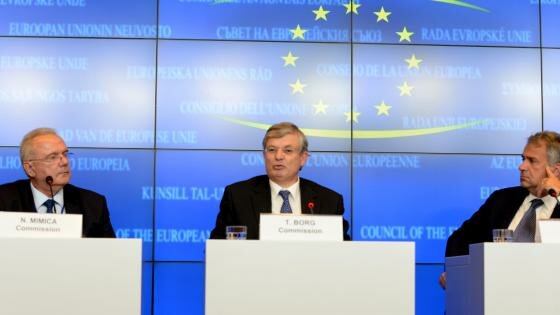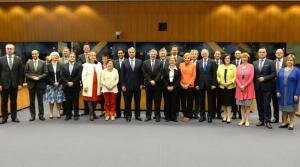- EPSCOEmployment, Social Policy, Health and Consumer Affairs Council (EPSCO)
Last EPSCO Health Council focuses on medical and in vitro diagnostic devices
The Council of Health Ministers, chaired by Greek Health Minister Makis Voridis, took place in Luxembourg today, 20 June 2014.
Minister Voridis stated that “central to the discussions were Regulations proposals for medical devices and in vitro diagnostic medical devices, which aim at creating a framework for producing and positioning in the market medical devices, re-establishing trust among consumers/users and economic stakeholders, simultaneously securing a high level of health protection.”
He further underlined that “the improvement of medical technology may also contribute to creating new jobs, cost reduction and strengthening of healthcare efficiency.”
The discussion, which took place on the basis of the progress report and the Presidency’s questions, demonstrated the willingness of member states to further strengthen the monitoring of the use of products following their introduction on the market with the capacity to intervene and undertake structural and preventive measures, but also in the evaluation of notified bodies’ confirmation and in the prospects of cooperation strengthening on an EU level.
The results of the discussions will significantly contribute to further developing the works, in order to make feasible an agreement at the Council’s preparatory working groups in autumn.
Council Conclusions were later adopted:
- With regard to the economic crisis and its effects on health and healthcare systems. The conclusions recognise the importance of health reforms, in order to overcome the crisis and the value of cooperation and exchange of best practices between member states in fields of common interest with regard to a) healthcare cost, b) the provision of health services, c) pharmaceutical products, d) health systems’ delivery evaluation and e) investment in prevention.
Conclusions trace sectors where further action should be taken, emphasizing on:
-The improvement of access to all in high quality health services
-The promotion of innovation and e-Health solutions
-The better use of structural funds and health systems’ delivery evaluation in health investment, and
-The attainment of co-understanding with regard to effective factors for efficient, accessible and enduring health systems.
-With regard to nutrition and physical activity, taking into account the results of the recent Athens Conference of 25-26 February, member states and the Commission are urged to assume initiatives for the promotion of a healthy diet and physical activity as efficient preventive measures during the lifecycle to confront obesity and chronic diseases, with an emphasis on the most vulnerable groups, such as children and the elderly.
Among other, the Commission and member states are urged to promote healthy diet, such as the Mediterranean diet, and nutritional guidelines.
The above constitute a solid basis for, on the one hand, promoting further initiatives on a prevention and health promotion level and, on the other, aiming at ensuring access to all in high quality health services.
The Greek Presidency - recognizing that health constitutes a value in itself and a prerequisite for economic development and social cohesion, which was put to test during the past years, particularly in member states where the results of the economic crisis were more immediate - worked for the realisation of set targets on a legislative and non-legislative level “seeking to ensure a high level of health protection to the Union’s citizens, with particular emphasis on the most vulnerable groups of the population.”
Following the Council’s conclusions, a signing ceremony of the Joint Procurement Agreement for medical countermeasures took place, an agreement that aims at securing equal access in and better prices of pandemic vaccines and pharmaceuticals to confront serious cross-border health threats.
Read more here.










